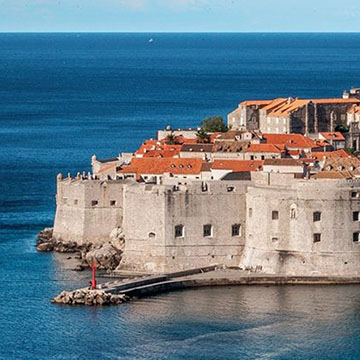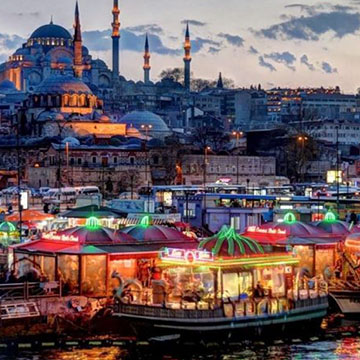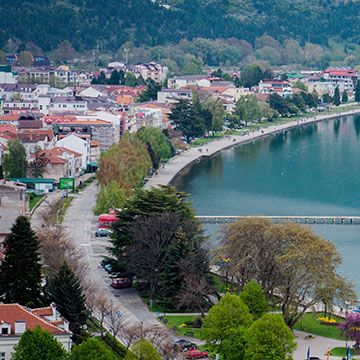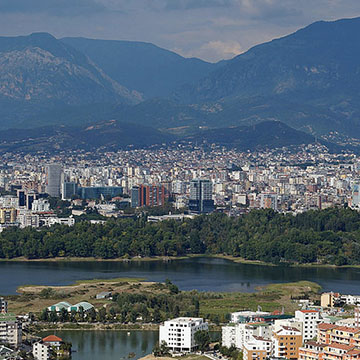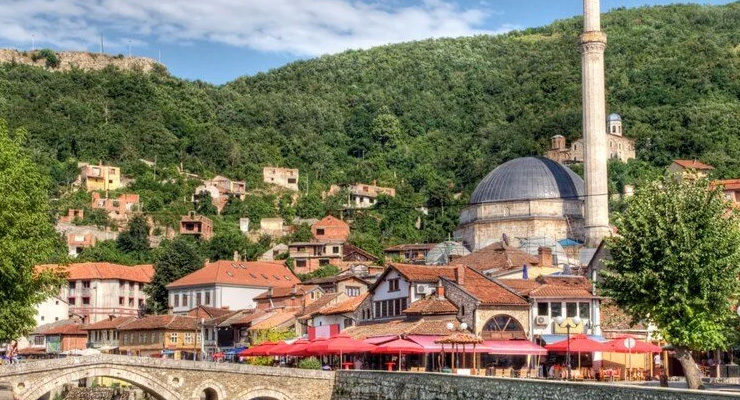
Kosovo
Kosovo, which has been under occupation for many years, declared its independence in 2008. This Balkan country, spreading over an area of 10,877 square kilometers, has a dense Muslim population due to its long years under Ottoman Empire rule. The Serbian Orthodox Church, listed on the UNESCO World Heritage Protection List, is also located in Kosovo and attracts tourists from different parts of the world. Traditional stone houses called "kullas" are among the country's tourist values.
Capital, Cities, and Regions of Kosovo
Kosovo is not administratively a single-entity country. The Republic of Kosovo, which declared its unilateral independence in 2008, has three different structures, recognized by the administration of NATO (UNMIK), and still claimed by the Republic of Serbia.
Where is Kosovo?
Located in the southeast of Europe and at the center of the Balkans, Kosovo declared its independence in 2008 after a major war with Serbia. The country shares borders with Serbia, Montenegro, the Republic of North Macedonia, and Albania.
When to Visit Kosovo?
Kosovo has a temperate continental climate. The most ideal time to visit the country, where winters are cold and snowy and summers are hot, is between May and September.
Kosovan Culture
When discussing political matters in Kosovo, you'll notice tensions rise. Of course, the choice is yours, but keep this information in mind. The country, with a predominantly Muslim population, is generally known for its hospitable people who take pride in their culture. Showing respect to the elderly is crucial in Kosovo. Additionally, almost 70% of the country's young population is under 35 years old. Taking photos of military facilities is not well-received, and the same applies to taking pictures of houses, which might result in negative reactions.
Kosovan Cuisine
Influenced by Serbian, Albanian, Turkish, and Greek cuisines, Kosovo is known for its best restaurants, usually found near villages close to major cities. Trout, sea bass, and salmon are widespread and popular in Kosovo's cuisine, where meat dishes are predominant. You'll encounter various types of "burek," resembling Turkish pastries, and Turkish cuisine-specific tastes like ayran and stuffed grape leaves. Traditional dishes like "raznjici" (skewered meat) and "cevapi" (charcoal-grilled and flavored with garlic and spices) are a must-try. The country is known for its variety of "burek" and traditional desserts. Local drinks include "slivovica" (plum brandy) and "vranac" wine made from grapes grown in Pristina. The tipping rate is approximately 10%.
Souvenirs from Kosovo
Euro is used in Kosovo. The cities of Pristina, Peja, and Gjakova offer the most shopping options. Kosovo is known for its widespread craftsmanship, and you can find unique gifts, especially metalwork made from silver, copper, and brass. Wood carvings and musical instruments are also popular souvenirs. Embroidery and knitting are among the local products.
Kosovo's Festivals
Many cultural and art festivals are organized in Kosovo, supporting Balkan artists and aiming to develop Balkan culture and relations. The International Youth Festival, organized by the International Balkan Associations in Pristina, is the first of these festivals. The festival includes folk dances, regional music, and traditional drama performances. Film festivals, such as Dokufest and the Kosovo International Film Festival, showcase local and international films. The Animation Film Festival in Peja, held in August, is an opportunity for young talents.
Holidays/Feasts/Important Days in Kosovo
· New Year's Day (January 1)
· Orthodox Christmas Day (January 7)
· Independence Day (February 17)
· Easter Monday (last Monday in March)
· Constitution Day (April 9)
· Labour Day (May 1)
· Orthodox Easter Monday (May 2)
· Europe Day (May 9)
· Ramadan Bayram
· Sacrifice Feast
· Christmas Day (December 25)
Kosovo's Climate and Weather
With a humid continental climate, Kosovo also experiences the influences of the Mediterranean and oceanic climates. The northeastern part is more influenced by the continental climate, resulting in cold and snowy winters. Summers are quite hot. The average annual temperature is around 9.5 degrees Celsius in winter and 19.2 degrees Celsius in summer. January is the coldest month, with temperatures dropping below 0 degrees Celsius. Prizren and Istok have a milder winter compared to other cities.
Short History of Kosovo
Throughout history, Kosovo hosted many civilizations, including the Huns, Avars, Bulgarians, Pechenegs, and Uzes. In the Roman Empire period, Kosovo covered the 'Dardania' region where the Dardanians lived. In 1444, Kosovo formed an alliance with Albania and Montenegro against the Ottoman Empire and remained under Ottoman rule for many years. The country, which joined the Ottoman territories in 1389, became part of Serbia in the First Balkan War in 1912. Transitioning to the Yugoslav provincial status during World War II, Kosovo faced Serbian oppression and military interventions in the process of Yugoslavia's dissolution after the fall of the Soviet Union. Liberated from Serbian rule by NATO intervention in 1999, Kosovo's independence was recognized by the United States, NATO, and the EU, but opposed by Russia, Greece, Cyprus, Serbia, Spain, and Azerbaijan. The country declared independence on February 17, 2008, and is still a very young country with many political struggles.
Kosovo's Economy
Kosovo has the highest unemployment rate in Europe, approximately 40%. To overcome this issue, the country has opened itself to European and American investors. Despite stable growth over the past decade, Kosovo faces fundamental problems such as inadequate infrastructure and the sustainability of energy resources. The country is engaged in sectors such as metal processing, leather and wood processing, and the production of simple machinery. Kosovo became a member of the International Monetary Fund (IMF) and the World Bank in 2009.
Languages Spoken in Kosovo
The official languages of the Republic of Kosovo are Albanian and Serbian. Turkish, Bosnian, and Romani are also spoken within the country and are officially recognized. Turkish is officially accepted in Prizren, Mamusha, Pristina, Mitrovica, Vucitrn, and Gjilan municipalities. In the Gora region of the country, a language between Bosnian and Macedonian is spoken.


